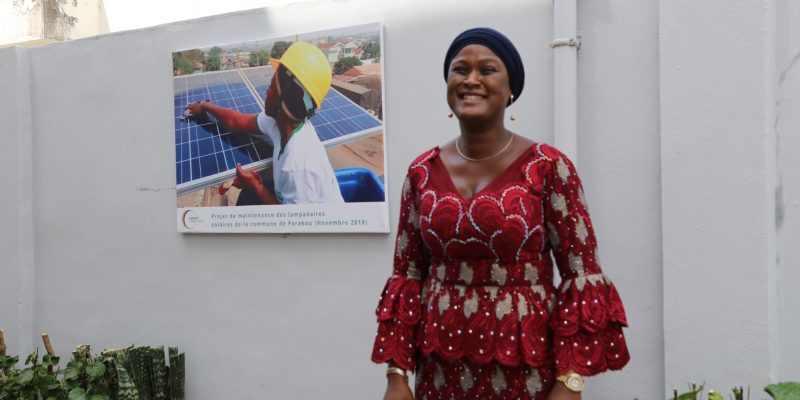
MCC beneficiary Madame Ismène founded Ismast Energy LLC, one of a few women-owned renewable energy product supply companies in Benin.
MCC’s $375 million Benin Power Compact, with an additional contribution of $28 million from the Government of Benin, focuses on modernizing Benin’s electric power sector by supporting policy reforms, modernizing Benin’s power grid, and attracting private sector investment into the energy sector. With the overall objective of expanding business productivity and economic opportunity, MCC’s compact has also funded the Women’s Energy Entrepreneurship initiative to support women-owned, or managed, businesses to grow their companies and improve their energy use.
How One Woman-Owned Renewable Energy Company Is Making Strides
Ismène Ahamide Zounmenou is not only an entrepreneur working in a challenging business environment, but she is also part of the small minority of female business owners specializing in renewable energy products in Benin. She is the founder and director of Ismast Energy LLC—a renewable energy product supply company. Ismène participated in the Women’s Energy Entrepreneurship training and following that, made major management improvements that have enabled her company to grow, including being awarded a contract to install energy efficient street lighting on a government-funded major road works project, and energy efficiency audits of factories and industrial buildings. Ismène has also forged a partnership with French multinational company, Engie, to implement a major $16 million off-grid electrification project co-financed by the MCC compact as part of its Off-Grid Clean Energy Facility. I recently had the chance to ask her more about her company and her experience as a female entrepreneur in a male-dominated sector.
Chris: How have your business practices changed since you participated in the MCA-Benin II Women’s Energy Entrepreneurship (WEE) initiative? What are your three main takeaways from WEE?
Ismène: Through my participation in WEE, I was able to broaden the range of what my company can offer, particularly energy efficiency services. I can now participate in calls for tender, have a better relationship with financial institutions, and have a highly-motivated team that understands the company's vision and works every day to achieve it.
My three main takeaways from the training and mentoring sessions are:
- A strong understanding of how good energy management allows efficient management of energy resources;
- A successful company is one that has a clear vision and spares no effort to achieve this vision.
- How to respond to calls for tender.
Chris: What specific challenges do women face working in Benin’s electricity sector?
Ismène: Women working in the electricity sector in Benin, particularly technicians or entrepreneurs, face the following challenges:
Credibility. Women must make greater efforts than men to gain the confidence of decision-makers in their ability to carry out a task or a project. For example, what we can take the man's word for, the woman must demonstrate through action before we believe in her.
Access to financing. Women entrepreneurs face limited possibilities for financing their projects, which, in turn, limits their enthusiasm to participate in the sector.
Qualified personnel. The success of any business depends on the quality of its workforce. Women are struggling to find qualified personnel to support them in achieving their vision, and the few qualified personnel available generally pursue their own entrepreneurship projects. So you might recruit and train someone only to find that they quit to become entrepreneurs!
People believe they can take advantage of women more easily. My first project involved distributing solar home systems for a foreign donor. When implementing the project, my first sales manager used the budget for outreach and communication to get married! Then, colleagues whom I trusted, stole solar home systems and created problems with project beneficiaries. I had to travel over 1,000 kilometers to sort all the issues out! These acts were carried out because the perpetrators saw me as a defenseless woman and a priori defenseless. At the same time, the experience helped me to take steps, not face the same setbacks again.
Chris: Why do you think it is important to encourage more female entrepreneurs and owners in Benin’s electricity sector?
Ismène: The electricity sector is booming in Benin. Women comprise more than 50 percent of the population and households are the main consumers of electricity. Having more women entrepreneurs in the sector not only promotes economic growth by empowering women, but also allows for better inclusion of women’s energy needs when shaping policies and programs.
Chris: Why do you think it is important that companies prioritize good energy efficiency?
Ismène: Energy efficiency is the cheapest way to increase the availability of energy resources and reduce the disparity in electricity costs. The less available electricity gets wasted, the more people it can serve.
Chris: What do you think of MCC's current investment into Benin’s electricity sector?
Ismène: I think it's great because access to electricity is vital. Thanks to the Benin II Compact, Benin now has an off-grid regulatory framework and concrete projects that can contribute to energy for all. This is a wonderful thing, compared to how things used to be.
In 2009, I worked on a project to build and operate a three-megawatt biomass power plant in northern Benin. We worked extremely hard on this project but it never saw the light of day because at the time Benin had neither a regulatory framework nor an enabling environment conducive to developing renewable energies. We were powerless in the face of the energy disparity and darkness in which our fellow citizens lived. The MCC compact has made possible everything that once was impossible, to facilitate access to electricity for all. This is really to be welcomed!
Chris: What do you hope the future holds for Benin’s electricity sector and for the women working in the sector?
Ismène: For the future, I hope for an electricity sector with sustainable growth. This will lead Benin to achieve affordable electricity for all. I hope that women participate equally in this growth alongside men and that electricity contributes to prosperity for the whole country.

